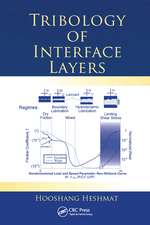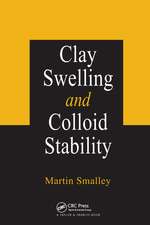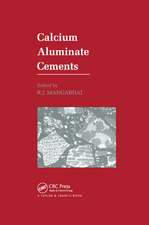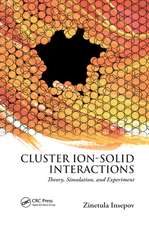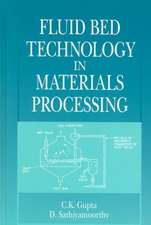Green Polymeric Nanocomposites
Editat de Satya Eswari Jujjavarapu, Krishna Mohan Polurien Limba Engleză Paperback – 30 sep 2021
- Describes green polymeric nanocomposites that show greater properties in terms of degradability, biocompatibility, synthesis process, cost effectiveness, mechanical strength, high surface area, nontoxicity, and environmental friendliness
- Explains the basics of eco-friendly polymer nanocomposites from different natural resources and their chemistry
- Discusses practical applications that present future directions in the biomedical, pharmaceutical, and automotive industries
This book is aimed at scientists, researchers, and academics working in nanotechnology, biomaterials, polymer science, and those studying products derived from eco-friendly nanomaterials.
| Toate formatele și edițiile | Preț | Express |
|---|---|---|
| Paperback (1) | 437.34 lei 43-57 zile | |
| CRC Press – 30 sep 2021 | 437.34 lei 43-57 zile | |
| Hardback (1) | 822.99 lei 43-57 zile | |
| CRC Press – 13 feb 2020 | 822.99 lei 43-57 zile |
Preț: 437.34 lei
Nou
Puncte Express: 656
Preț estimativ în valută:
83.71€ • 90.96$ • 70.36£
83.71€ • 90.96$ • 70.36£
Carte tipărită la comandă
Livrare economică 21 aprilie-05 mai
Preluare comenzi: 021 569.72.76
Specificații
ISBN-13: 9781032174846
ISBN-10: 1032174846
Pagini: 340
Ilustrații: 59 Illustrations, black and white
Dimensiuni: 156 x 234 x 18 mm
Greutate: 0.48 kg
Ediția:1
Editura: CRC Press
Colecția CRC Press
ISBN-10: 1032174846
Pagini: 340
Ilustrații: 59 Illustrations, black and white
Dimensiuni: 156 x 234 x 18 mm
Greutate: 0.48 kg
Ediția:1
Editura: CRC Press
Colecția CRC Press
Public țintă
AcademicCuprins
1. Introduction. 2. Source of Natural Polymers from Animals with Green Nanoparticles. 3. Source of Natural Polymers from Plants with Green Nanoparticles. 4. Source of Natural Polymers from Microbes with Green Nanoparticles. 5. Comparative Studies of Various Sources for Green Polymeric Nanocomposites. 6. Green Polymeric Nanocomposites Applications. 7. Future Perspectives.
Notă biografică
Dr. Satya Eswari Jujjavarapu is currently working as an Assistant Professor in
the Department of Biotechnology at National Institute of Technology (NIT), Raipur,
India. Her fields of specialization include bioinformatics, biotechnology, and process
modeling, evolutionary optimization, and artificial intelligence. She has more
than 35 publications in SCI/Scopus-indexed journals and 35 proceedings in international
and national conferences. Her research contributions have received wide
global citations. She has also published six book chapters and four books (currently
in press) with international publishers. She is an active member of various organizations
and has received various awards.
Dr. Krishna Mohan Poluri is currently working as an Associate Professor in the
Biotechnology Department, IIT-Roorkee. He earned his PhD from Tata Institute of
Fundamental Research TIFR–Mumbai, and Post-doc from Rutgers University and
University of Texas Medical Branch (UTMB–Texas). His areas of expertise are
structural biology, protein engineering, biomolecular interactions, glycoimmunology
and structure-based design of therapeutics and scaffolds, bionanotechnology
and algal biotechnology, etc. He has published 85 publications, including research
articles, editorials, books, and book chapters in various reputed international journals.
He has authored the book Protein Engineering Techniques. Dr. Poluri is also
a guest editor/editorial board member and ad hoc reviewer for several international
research journals. He has won several awards and fellowships for his research work,
most prominently the Young Scientist Award from the Indian Science Congress
Association (ISCA), 2009, National Academy of Sciences India (NASI), 2014, and
Innovative Young Biotechnologist Award (IYBA), 2013, by DBT.
Descriere
The book covers green polymeric nanocomposites that show greater properties in terms of degradability, biocompatibility, synthesis process, cost effectiveness, mechanical strength, high surface area, nontoxicity, and environmemntal friendliness. These are beneficial to agricultural, biomedical, food processing, pharmaceutical, and other fields.



